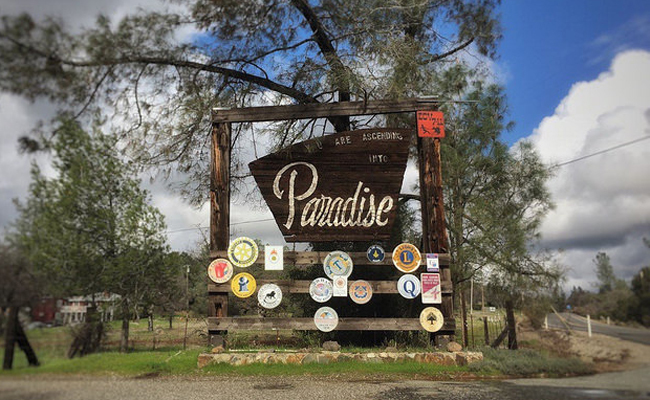A WildFire Destroyed Paradise

At a town hall meeting 13 miles from Paradise, California, A lawyer explains to survivors of the state’s most devastating wildfire why they should choose his law firm to sue PG&E Corp.
He teeters on the edge of hearing stories of people adapting to the obliteration and selling them on the ability of his law firm, based thousands of miles away. Under the law, he says, the dozen or so inhabitants who’ve assembled for this gathering on a Saturday in December have two years to file a claim. Yet, the lawyer urges them not to procrastinate for that long, inferring that if they sign on now they’ll have a front seat arranging a payout from the utility.
“If we have the largest caseload, who is PG&E going to deal with first?”
A huge number of lawyers are competing for the opportunity to sue the $12 billion utility company, even before state examiners have determined the reason for the November wildfire in Paradise that incinerated 13,972 homes and killed 86 individuals. Uprooted inhabitants living in shelters or temporary lodging in adjacent towns have ended up immersed with legal advertisements on signs, billboards, radio, TV and mailers.
The competition for these cases are intense to the point that a few California-based lawyers who’ve built up a claim to fame suing utilities over rapidly spreading fires allude to out-of-state firms as “carpetbaggers.”
This particular lawyer’s firm, Washington, D.C.- based Mauro Archer & Associates, made itself emerge from the crowd of other law firms by recruiting as its point-person maybe the most well known individual ever to fight with PG&E – Erin Brockovich. Her achievement in a court case against the utility over water defilement during the 1990s roused a film bearing her name that won an Oscar for Julia Roberts, as well as, helped Brockovich enter a profession as an activist, author and consultant.
Edison, PG&E Are Targets as Fires Press Lawyers Into Action
Mauro Archer and its co-counsel firm, San Antonio-based Watts Guerra, now claim to have retained over 700 clients from November’s Camp Fire in Paradise, CA.
Numerous homes in Paradise were underinsured or needed insurance entirely, which can make the suits progressively worthwhile for lawyers, who for the most part take a 33.3 percent cut of any uninsured recuperation. In general, protected losses from the Camp Fire have reached about $7 billion and Citigroup Inc. estimates about $15 billion in gross liabilities.
Even before people attended the lawyer’s Dec. 15 presentation, many chose to sign on with his firm because of its association with Brockovich, which people found while browsing on the web.
“I know there are quite a few law firms out there doing this but I really wanted to be with the firm that Erin Brockovich was connected to.”
To veteran wildfire attorneys, Brockovich is “client bait.”
“They have the money to hire Erin and somehow clients say, ‘This is the place to go.’ But anyone could’ve done that,” the veteran wildfire attorney also said. “Because Erin Brockovich is not working on your case, it’s the wrong thing to be looking at.”
Suing PG&E is costly, and there’s no uncertainty that organizations from out of state bring a lot of money to fund the battle. In any case, is it questionable that those organizations are dedicated to the “grunt work” of planning for a trial against an organization battling for its survival?
These lawyers from out of state, they wind up not appearing, they get pushed aside, they’re not associated with the procedure. It comes down to the same couple of lawyers for each situation like this who are taking the necessary steps in court and generally driving the train.
Still the out of state firms can end up with a very profitable payday by gathering up and settling suits on a “mass basis” to make up for the cash they’re leaving on the table.
Nobody wants to hire a Texas lawyer for a case in California. So out-of-state firms team up with “a local straw man” who does the advertising so it appears to be local, yet the funding behind it is from the Texas firm.
Watts Guerra co-founder Mikal Watts, a nationally recognized lawyer, rejects the thought that he’s a shark trying to benefit from a territory where he is not based out of. His firm’s site touts “a group of nearby experts who live and work in the neighborhoods affected by the fires and are profoundly worried about its recuperation.”
Since his firm began prosecuting cases against PG&E in the wake of the 2017 wildfires that tore through the sonoma wine country north of San Francisco, Watts said he has spent over $10 million preparing for these cases. The costs run from California-based arborists and forensics specialists to a mobile home and an $81,000 trailer he has set up in Chico, CA.
Brockovich said she was attracted to the D.C.- Texas law group because of the fact that it’s put resources into building a local presence. She sees herself not as a marketing tool, but rather as a guide for the unfortunate people having to deal with a “feeding frenzy” of attorneys.










